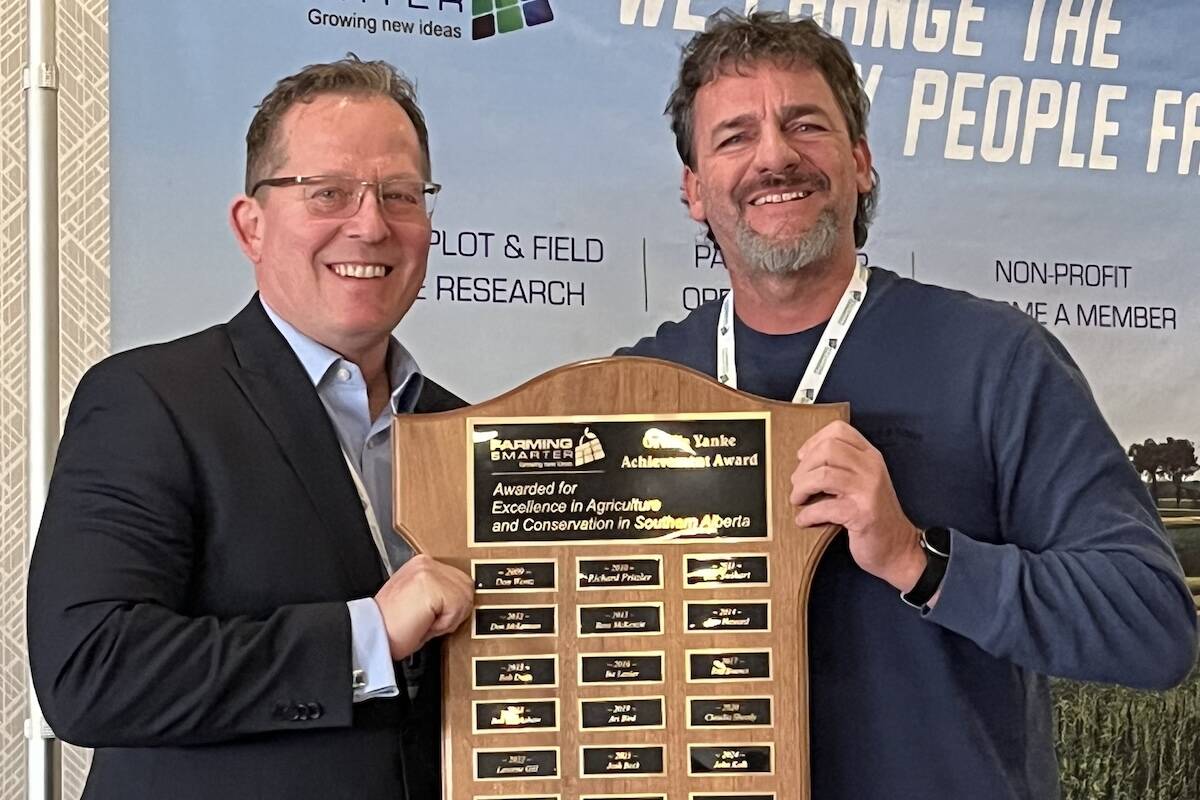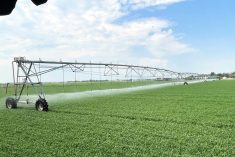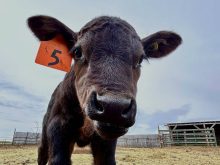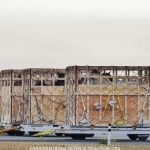TOO MANY BEARS A rancher in the southwest corner of the province is applying to carry a handgun for his own protection
Ryan McClelland likes bears, but he doesn’t want to end up in the belly of one.
“I don’t leave the house anymore without packing a gun with me,” he said. He lives near Beaver Mines, a small hamlet southwest of Pincher Creek, with his wife Jessica and their three children. McClelland is the fourth generation on the ranch, and while the family has a long history in the hills of Beaver Mines, the grizzly bear chapter is a relatively new one.
“Until maybe five or eight years ago, a grizzly bear was a strange thing to see,” McClelland said. He rarely sees black bears any longer, whereas they used to be seen regularly.
Read Also

Half a million plots and a lifetime of impact: Dr. Brian Beres wins Orville Yanke Award
The renowned Alberta scientist celebrated three decades of agricultural innovation and the pioneering of the GEM framework at the 2026 Farming Smarter Conference.
In the early-morning hours of Oct. 21, McClelland was awoken by his dog barking and what he found astounded him.
“There was a grizzly at the garage, right outside the house,” he said, adding that the first bear was a large male. But that wasn’t all — he found another eight of the beasts exploring his property, one of which had already broken into the family’s business, McClelland’s Meat Processors, a small meat-packing shop. The big boar breached the door to the meat shop to snack on a quarter of beef.
Meanwhile, a sow with three cubs had broken into a granary, and a second sow with two cubs had destroyed her way into a second granary. “Everybody is getting in, but nine bears in one night just raised so many flags,” he said, adding that folks in the area have to be well armed these days just to go and fix fence. “We’ve got wooden granaries that are 60 years old that in the last five years have been attacked, and they never were before that.”
The family’s story has received press coverage across the province, but many reader comments indicate blame is being placed on McClelland for attracting the bears by having grain on the property, and the meat shop. However, he says his meat-processing business is clean, and that he reduces any odours or attractants as much as possible.
“I get rid of my scraps either that day, or the first thing the next morning so that they never hang around and create any odour,” he said, adding that the second boar was clearly attracted by his house as well.
Costly repairs
McClelland said the family has been upgrading the property and infrastructure in an effort to make it more bear-proof since the grizzlies have become a problem, but each project costs money and it’s not financially feasible to be able to complete it all at once. The ongoing grizzly problem creates other bills that must be paid. He’s replaced the door to the meat shop with a new steel one, replaced a customer’s lost quarter of beef, and other repairs have been undertaken as needed. “They’ve eaten grain, and they waste more than they eat. I’ve lost hundreds of bushels of barley and oats they’ve spread on the ground. They’ve torn doors open on metal bins, they’ve torn wooden granaries apart, and they wreck corrals. It’s cost thousands and thousands of dollars as the years go by,” he said, adding there is no compensation available for the escalating damages.
“In the last five years, it’s been horrible. We’re allowed to protect ourselves, but we’re not allowed to protect our possessions or our livestock or our farm.”
McClelland’s experience isn’t an isolated one. Throughout this area, producers and rural residents are seeing an increased grizzly population and what appears to be displacement of the black bear population as a result. The Crowsnest Pass to the west is a key wildlife corridor, and the south end of the area is bordered by Waterton National Park and Glacier National Park on the U.S. side of the border. These factors create a funnel effect that serves to increase potential human and wildlife conflicts.
The southwest corner of the province comprises just three per cent of Alberta’s land area, but accounts for 37 per cent of livestock predation claims, most of which result from wolf predation.
McClelland and others in the area are concerned that these encounters will eventually end up in tragedy as the frequent encounters appear to be habituating some animals to human activity. “The bears aren’t scared anymore. I can drive down below through our granaries and they’re walking away from me, or just standing up and looking at me,” he said. Area conservation officers were called immediately and McClelland says they have done everything they can to help with the situation. One of the boars, the one believed to have broken into the meat shop, was elderly and in poor condition and was subsequently euthanized. The other boar was relocated.
McClelland is so concerned for his family’s safety, he’s applying for authorization to openly carry a handgun for protection. The application is permitted under Canadian law, but permission is usually only granted to people living in very remote areas with large predators, few people, and where it isn’t practical to constantly carry a long gun for protection. Nonetheless, McClelland is optimistic his request will be granted and says the Pincher Creek RCMP have offered their recommendation for approval based on his circumstances.














